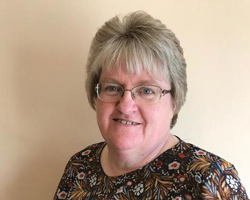Daragh Rodger: leading to support healthy ageing in Ireland

Daragh Rodger
“I’ve always wanted to be a nurse, I never wanted to do anything else,” says Daragh Rodger. Her childhood dream became a reality when she qualified as a general nurse in 1989 through the apprenticeship model. But this was merely the starting point of a diverse 30-year career, which has included taking a leading role on groundbreaking initiatives related to healthy ageing in Ireland.
Daragh’s focus on caring for older people began in 1996, when she joined the nursing staff at St Mary’s Campus in Dublin, one of the largest facilities in the country for the care of older adults – and where she still works today.
In 2003, Daragh was asked to set up a rapid access clinic that would provide a guarantee to see older patients within 72 hours. At the time, it could take more than 6 months for older people to get an outpatient appointment. The clinic’s services were vital for people over 65 who needed urgent, but not emergency, care.
Over the course of 4 years running the clinic, Daragh gained a deeper understanding of the many factors and conditions required to support healthy ageing. She transitioned to a role as a clinical nurse specialist in health promotion and assessment of older people, with the aim of taking a holistic and supportive approach to their healthy ageing and to the communities around them.
Drive to improve – recognizing needs and finding ways to meet them
“I’ve always had a drive to see improvement, and at the end of the day I want to provide the best care possible,” says Daragh.
This philosophy has motivated her to continue learning and developing professionally throughout her career. She completed a diploma in gerontological nursing through the Royal College of Surgeons in 1995, and went on to earn her nursing degree in 2005.
Even then, she wasn’t satisfied. Daragh returned to school part-time to earn a master’s degree in 2009, a certificate in nursing in 2010 and a postgraduate certificate in advanced practice in 2011. In 2012, she registered with the Nursing and Midwifery Board of Ireland as a Registered Advanced Nurse Practitioner specializing in Care of the Older Adult Community.
Daragh’s commitment to her professional development has been matched by her efforts to make life better for the patients she serves. For example, she recognized a lack of education about bone health among some of her peers as well as the older adults she served, so she took it upon herself to meet this need.
She developed a nurse-led healthy ageing clinic that conducts bone health assessments, screening for osteoporosis and bone health education to all attendees. She also collaborated with an educational technologist to develop a bone health education programme and accompanying website, which has been recognized across Ireland and internationally.
Her work on bone health led Daragh to see a further need for a falls prevention programme. She initiated and led a project team tasked with creating such a programme for St Mary’s. Using research and evidence from Ireland, the United Kingdom and other countries around the world, the team developed the Forever Autumn falls prevention programme. Rolled out at St Mary’s in 2012, it uses many elements to support the reduction of falls, such as leaf symbols to help individual patients and residents easily identify the risk of falls.
One year after implementing the Forever Autumn programme, St Mary’s Campus had experienced a 35% reduction in falls, and these results have now been sustained over several years. In addition to using the risk-assessment leaf symbols, the programme pioneered by Daragh and her colleagues involves all staff – nurses, health-care assistants, administrative staff, cleaners – in helping to prevent falls among patients and residents. It also places a high priority on surveillance and tracking, not only of falls but also of the interventions that help to prevent them from taking place.
Dozens of community hospitals and other facilities throughout Ireland have adopted the programme and have seen similarly positive results. Today, a community of practice on the topic of falls includes nearly 80 professionals from a range of clinical fields.
“It has turned into something bigger than I ever expected,” says Daragh. “But if I recognize something needs to be done, I like to follow it all the way through.” She is currently working on her PhD, focusing on the impact of the Forever Autumn programme.
Making a difference – on a large scale and an individual level
Daragh is perhaps most recognized for her work as a nurse leader in pioneering new programmes and initiatives that have a significant impact. Nonetheless, she still views her clinical role as the most satisfying part of her work, and she maintains a caseload of anywhere from 15 to 40 patients at a given time.
She is motivated by a desire to help people age in place and in a way that gives them the best possible quality of life for as long as possible. “If I can empower people to look after themselves, and to get support and help at an earlier time, then hopefully the outcomes will be better for them,” she says.
One of Daragh’s patients faced a number of health challenges when they first met in 2012, and had been advised that nursing home care was required. Still, she was deeply committed to staying in her own home. At the time, Daragh told her, “You work with me, I’ll work with you and we’ll work through this together.”
More than 7 years later, the patient is still living at home, surrounded by a strong group of carers and experiencing a good quality of life. “This is why I love my job,” says Daragh. “It’s making a difference to someone and supporting them to age well.”



